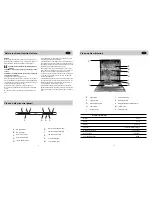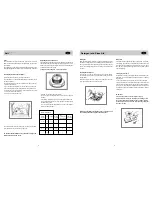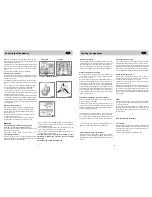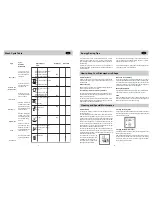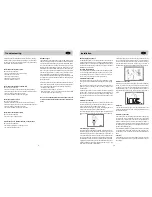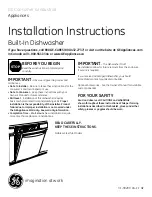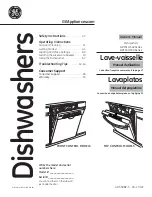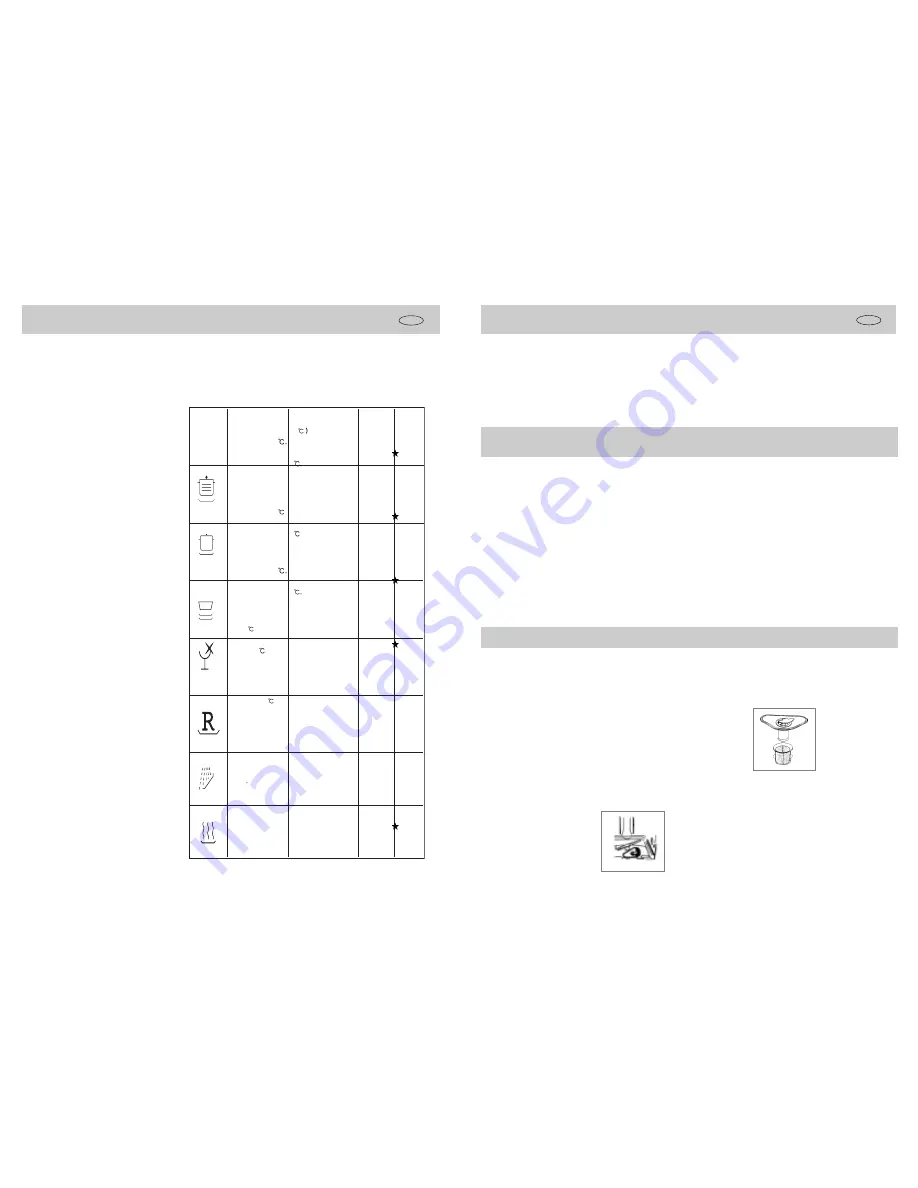
.7.
Wash Cycle Table
GB
Cycle
Cycle
Selection
Information
Description of
Cycle
Normal Wash
(IEC-EN50242)
Heavy Duty
Light Wash
Glassware
Rapid Wash
Soak
Normal dirty dishes,
pots and pans. Stan-
dard daily cycle.
Very dirty dishes,
pots and pans. (Not
to be used with deli-
cate items)
Normal dirty dishes,
pots and pans without
dried on residue.
Economic, fast cycle to
be used for items which
are sensitive to higher.
Run immediately after
dishes are used.
Economic, fast cycle to
be used to on not very
dirty dishes right after
they are used. No dry-
ing cycle.
Pre-wash of dishes,
pots and pans while
waiting for the load to
be completed after the
subsequent meal.
Pre-wash with hot water (45
.
Extended wash at 70
Rinses with cold water.
Rinse with hot water at 70
Drying.
The second pre-wash use cold
water.
Extended wash at 55
.
Rinse with cold water.
Rinse with hot water at 70
.
Drying.
Wash at 50
.
Rinse with warm water.
Hot rinse at 70
.
Drying.
Short wash at 50
.
Cold rinse.
Short cold wash to prevent
food residue from drying on
the dishes
30g
30g
15g
15g
Pre-wash with cold water.
Extended wash at 55
Rinse with cold water.
Rinse with hot water at 70
Drying.
30g
Detergent
Rinse Aid
.8.
Energy Saving Tips
GB
-It is important to try and run the dishwasher when it is fully
loaded in order to save on energy. In order to prevent odors
from forming and food from caking onto the dishes, you can run
the hold cycle.
-Choose the right wash cycle: the choice of cycle depends on
the type of dishware, cookware and utensils being washed and
how dirty they are.
-Use the right amount of detergent: if you use too much deter-
gent, the result will not be cleaner dishes, but, rather, a greater
negative impact on the environment.
-There is no advantage in rinsing dishes, cookware and utensils
before placing them in the dishwasher.
How to keep Your Dishwasher in Shape
After every wash, turn off the water supply to the appliance and
leave the door slightly ajar so that moisture and odors are not
trapped inside.
After Every Wash
Before cleaning or performing maintenance, always remove the
plug from the socket. Do not run risks.
Remove the plug
To clean the exterior and rubber parts of the dishwasher, do not
use solvents or abrasive cleaning products. Rather, use only a
cloth and warm soapy water.
To remove spots or stains from the surface of the interior, use a
cloth dampened with water and a little while vinegar, or cleaning
product made specifically for dishwashers.
No solvents or Abrasive Cleaning Products
When you go on holiday, it is recommended that you run a wash
cycle with the dishwasher empty and then remove the plug from
the socket, turn off the water supply and leave the door of the
appliance slightly ajar. This will help the seals last longer and
prevent odors from forming within the appliance.
When You Go on Holiday
If the appliance must be moved, try to keep it in a vertical position.
If absolutely necessary, it can be positioned on its back.
Moving the Appliance
One of the factors that cause odors to form in the dishwasher is
food that remains trapped in the seals. Periodic cleaning with a
damp sponge will prevent this from occurring.
Seals
Cleaning and Special Maintenance
Filter Assembly
For best performance and results, the filter assembly must be
cleaned frequently.
The filter efficiently removes food residue from the wash water,
allowing it to be recirculated during the cycle. For this reason, it
is a good idea to remove the larger food particles trapped in the
filter after each wash cycle by rinsing the "A" semi-circular filter
and cup under running water. To remove the filter assembly, pull
on the cup handle in the upward direction. The entire filter as-
sembly (made up of the "A" semicircular filter and the "B" fine
filter) should be cleaned at least once a week.
To clean the filter and the fine filter, use a cleaning brush. Then,
reassemble the filter parts as shown in the figures below and
reinsert the entire assembly in the dishwasher, positioning in its
seat and pressing downward.
The dishwasher must never be
used without the filters. Improper
replacement of the filters may re-
duce level of the appliance and
damage dishes and utensils.
Cleaning the Spray Arms
It may happen that food particle become encrusted on the spray
arms and block the holes. Check the spray arms periodically and
clean them when needed.
Cleaning the Water Inlet Filter
Periodically clean the water inlet filter (see figure) located on the
outlet of the water supply tap.
After turning off the water tap, unscrew the end of the water sup-
ply hose, remove the filter and clean it carefully under running
water. Then, return the filter to its place and tighten the water
supply hose back into position.
A
B
The cycle of heat wash-
ing and dry tableware.
Heat washing.
Heat wash


